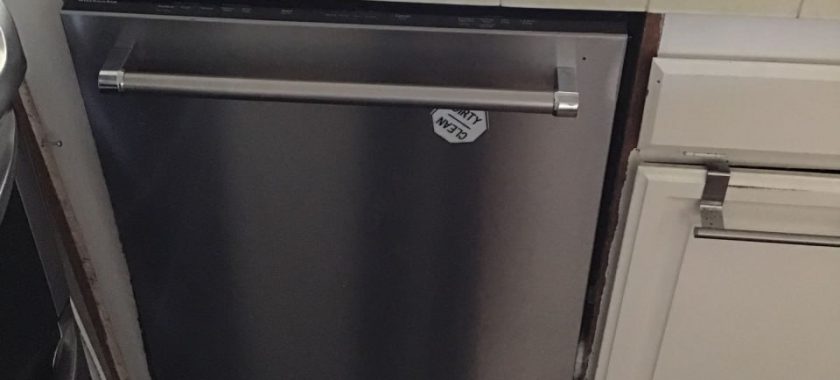Dishwashers are a staple in modern kitchens, designed to make our lives easier by handling the mundane chore of washing dishes. However, when a dishwasher starts making unusual or excessive noise, it can quickly disrupt the harmony of your home. If you’ve been hearing clanking, grinding, or other strange sounds during your dishwasher’s cycle, it’s important to address these issues before they lead to more serious damage. In this article, we’ll explore the common causes of noise during dishwasher operation and what you can do to resolve them.
Types of Dishwasher Noises
⠀
Before diving into the causes, it’s essential to differentiate between the types of noises you might hear. Each sound can signal a different problem:
⠀
– Banging or Clunking: Often caused by dishes or utensils clattering inside the unit.
– Grinding or Buzzing: A mechanical issue could be at play, especially with the motor or pump.
– Rattling: Loose or improperly loaded dishes can cause this.
– Squealing: Can indicate a problem with the motor or a worn-out part.
– Humming: Often points to electrical or motor issues.
⠀
Understanding these noises will help you identify the problem and decide whether it’s something you can fix yourself or if it requires professional assistance.
⠀
Common Causes of Noise During Dishwasher Operation
⠀
- Improper Loading of Dishes
⠀
One of the most common and easily resolved issues is improper loading. When dishes are stacked too closely together or utensils are placed inappropriately, they can rattle, bang, or clink during the wash cycle. Heavy items like pots and pans can cause even louder noises if they’re not properly secured. To avoid this:
⠀
– Ensure that items are placed in their designated areas, with ample space between them.
– Secure large items so they don’t move during the cycle.
– Make sure utensils are placed in the proper holders to avoid clattering.
⠀
- Obstructed Spray Arm
⠀
The spray arm is responsible for distributing water throughout the dishwasher during a cycle. If it’s obstructed by large dishes or utensils, it can hit these items, resulting in banging or thumping noises. To prevent this:
⠀
– Check the position of the spray arm before starting a cycle.
– Rearrange items that are blocking its path.
– Ensure the spray arm is free to rotate without obstruction.
⠀
- Worn-Out or Faulty Bearings
⠀
If your dishwasher’s noise resembles a grinding or squealing sound, it might be due to worn-out or faulty bearings in the motor or pump. The bearings help the motor and pump function smoothly, and when they wear out, the resulting friction can cause significant noise. This issue often requires professional intervention to replace the faulty parts.
⠀
- Malfunctioning Pump
⠀
The dishwasher pump is responsible for circulating water and draining it at the end of a cycle. If the pump is malfunctioning, it can produce a grinding or humming noise. Often, debris like food particles or small objects can get stuck in the pump, causing it to work inefficiently and noisily. In this case, cleaning the pump may resolve the issue, but if the pump is damaged, it will likely need to be replaced by a professional.
- Worn Wash Impeller
⠀
The wash impeller is part of the pump that helps push water through the spray arms. Over time, this component can wear down or become damaged, which may result in a grinding or whining noise. If you suspect a worn impeller, a professional technician can inspect and replace it if necessary.
⠀
- Loose or Damaged Dishwasher Parts
⠀
Loose or damaged internal components such as screws, brackets, or the dishwasher’s door latch can also cause unusual sounds. If these parts aren’t properly secured, they may rattle or vibrate during the wash cycle. Regularly checking and tightening any loose parts can help reduce noise. In some cases, if parts are damaged, they will need to be replaced.
⠀
- Water Inlet Valve Issues
⠀
If you hear a humming or buzzing sound at the beginning of the cycle, it may be due to an issue with the water inlet valve. This valve controls the flow of water into the dishwasher, and if it becomes clogged or defective, it may struggle to function, leading to noise. A professional technician can inspect the valve and replace it if needed.
⠀
- Drainage Problems
⠀
A gurgling or humming noise during the draining phase of the cycle might indicate a problem with the drainage system. Blocked or damaged hoses, as well as a faulty drain pump, can cause this. Clearing out any blockages or having the drain pump inspected by a professional can resolve this issue.
⠀
When to Call a Professional
⠀
While some causes of dishwasher noise can be easily resolved with a quick rearrangement of dishes or cleaning of parts, more serious issues like worn-out bearings, malfunctioning pumps, or faulty valves will likely require professional assistance. Ignoring these problems can lead to further damage, higher repair costs, or even a complete breakdown of your appliance.
⠀
If your dishwasher continues to make unusual noises despite your efforts, it’s best to consult an expert.
⠀
Chula Vista Appliance Repair Company: Your Trusted Dishwasher Repair Experts
⠀
At Chula Vista Appliance Repair Company, we specialize in diagnosing and repairing all types of dishwasher issues, including noisy operation. Our skilled technicians are experienced in handling a variety of appliance problems and will provide you with prompt, reliable service. Don’t let a noisy dishwasher disrupt your home – contact us today to schedule an appointment. We’ll get your appliance running smoothly again in no time!
⠀
Call us or visit our website to book a repair service today!
⠀
Contact us
(619) 880-5508


